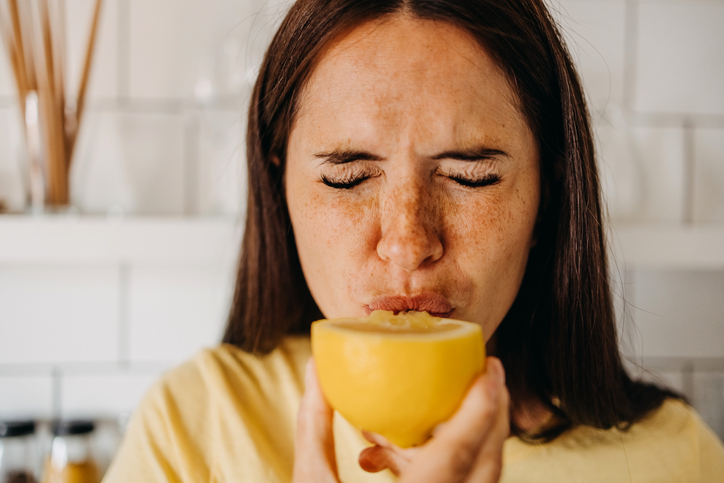Practicing Mindfulness May Be What’s Missing From Your Proactive Health Arsenal

By Joy Stephenson-Laws, JD, Founder
Close your eyes. Breathe. Focus. I now want you to feel as though you are biting into a big, juicy lemon wedge. What did you notice? I bet you started to salivate or maybe even felt a tingling sensation in your mouth. You may have even puckered. That’s how powerful your thoughts are.

We have around 60,000 thoughts every single day! I believe every one of these thoughts has an impact. Many of these thoughts focus on the past, and not in a good way.
- I can’t believe I said that.
- I should have never wasted all those years in that bad relationship.
- I wish I had taken better care of myself when I was younger.
- I should have saved more money before I had kids.
On the other side of the coin, some of these thoughts live in the future. And, again, not in a good way.
- I won’t be able to retire until I’m 90!
- I’m going to be single forever.
- What if one of my parents gets really sick?
- What if my child is a troublemaker in high school?

Obviously, the latter of these is where you want to live. This of course, is easier said than done, but practicing mindfulness is all about being in the present moment. It can be done if you make the effort and stay consistent. It may also benefit your health in ways you never thought (pun intended) of.
What exactly is mindfulness?“It’s possible to train yourself to focus on the present moment. You become aware of what’s going on inside and around you—your thoughts, feelings, sensations, and environment. You observe these moments without judgment. This is called mindfulness,” according to an article from the National Institutes of Health (NIH).
“Mindfulness has its roots in Buddhist meditation. Meditation is a practice that aims to increase awareness of the mind and concentration.”
Mindfulness has also been described as a state of active, open attention to the present.
Meditating can be difficult to incorporate into your daily routine if it is not in your current proactive health regimen. Some may find it hard to find the time or a quiet space or even feel it is very difficult to sit still. I hear many people say that they are bad at meditation, because their mind is always racing. Some people may identify inner struggles and difficulties and find them painful with no way of healing them. The concept behind meditation and mindfulness is to pretend those thoughts are just cars or people that are passing by. You can acknowledge them and then move on to the present moment, which can be just focusing on your breath or the sounds you hear in nature while sitting outside.
You also don't have to sit still to practice mindfulness.
“But mindfulness doesn’t have to be done sitting still or in silence. You can integrate the practice into things you do every day, like walking or eating. You can also be mindful while interacting with others,” (NIH).
So what are the potential health benefits of practicing mindfulness?“Mindfulness-based treatments have been shown to reduce anxiety and depression. There’s also evidence that mindfulness can lower blood pressure and improve sleep. It may even help people cope with pain,” according to the NIH.
Famous singer Jewel said mindfulness helped her cope with childhood trauma and being homeless.
“It’s literally as simple as, when you’re in a really negative space and you feel tight and contracted, find something to be grateful for. It can be the feeling of your feet on the ground, or the sunlight coming through a tree, or anything. If you pick something to be grateful for, your body actually responds. Your blood vessels dilate, blood flow patterns charge into your brain, and you get a feel-good rush. It’s that simple,” Jewel said in an interview with People Magazine.
One study even found evidence suggesting that mindfulness may improve cognitive health in older adults.
“Other studies have found preliminary evidence that mindfulness might boost the immune system and help people recover more quickly from cold or flu,” according to the American Psychological Association.
Mindfulness may even help people fight smoking and addiction. And because mindfulness is connected to stress reduction, this can mean less chronic inflammation in the body. Stress contributes to inflammation, and inflammation is known as one of the biggest contributors to several types of health issues such as depression, cancer, heart disease and more. I certainly believe that mindfulness is one of the keys to happy and healthy longevity.
You can be mindful 24/7, but here are specific examples on when you can be mindful.
- Playing with your kids - Stay off your phone and notice how focused your child is playing with that toy car and scooping sand. It’s as if nothing else in the world matters, because it doesn’t. That’s mindfulness!
- Sitting in traffic - Obviously, this is not a situation any of us want to be in, but this is an opportunity to focus on your breathing and just accept that this is where you are in the present moment and you cannot move the cars out of the way.
- Going on a hike - This is the perfect opportunity to be present with nature.
- Playing golf - This sport is a great way to practice mindfulness. I know that when I play golf, I try to be completely immersed in the present. Even professional golfers use mindfulness to help their game.
- Crocheting or doing an activity that you find meditative (maybe that’s cooking or working on a puzzle) - Anything that is enjoyable to you and facilitates deep focus in what you are doing is great for mindfulness.
Remember, mindfulness is a practice and you will get better with time if you are not already practicing it. Focus on consistency and not perfection. Leave the past where it belongs (behind you). Forget the future because we can’t predict it and it’s not even promised. Cherish the present. It’s called the ‘present,’ because it truly is a gift.
Finally, it might not be a bad idea to take a comprehensive nutrient test. Nutrient imbalance or deficiency may delay your ability to fully embrace mindfulness. Optimal brain health is important. If you discover you have any nutritional issues, a competent healthcare professional can work with you to adjust your diet and possibly recommend quality supplements you can include in your regimen.
Enjoy your healthy life!
Disclaimer: This article is not intended to provide medical advice. Please consult with your doctor or another competent healthcare practitioner to get specific medical advice for your situation.
The pH professional health care team includes recognized experts from a variety of health care and related disciplines, including physicians, attorneys, nutritionists, nurses, and certified fitness instructors. This team also includes the members of the pH Medical Advisory Board, which constantly monitors all pH programs, products, and services. To learn more about the pH Medical Advisory Board, click here.







